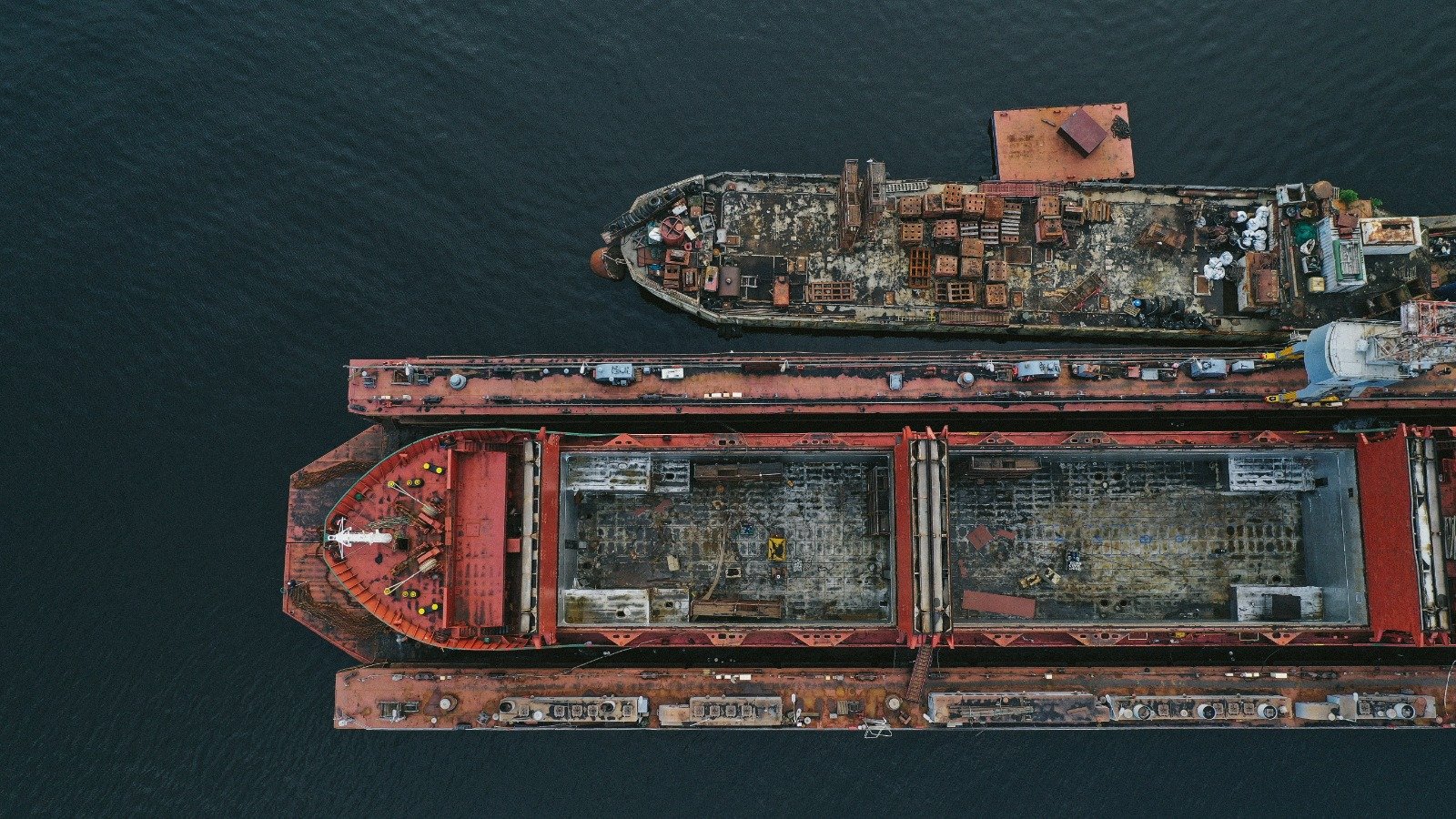Recycling Process
-
Neptunus employs a systematic approach to ship recycling, beginning with the meticulous inspection and clearance process conducted by relevant authorities such as maritime boards, customs, and
environmental agencies. Upon receiving clearances, ships are safely brought to shore by tugboats and maneuvered onto a dedicated rail track known as a slipway.
-
Once positioned on the slipway, locomotives carefully haul the ship along the tracks to the designated dismantling dock, mitigating the risk of abrasion to the ship's hull and minimizing the release of
harmful substances such as lead and arsenic into coastal land. This method ensures the preservation of the marine ecosystem while facilitating efficient dismantling operations.
-
At the dismantling dock, ships are lifted from the slipways and placed on designated platforms for dismantling. Neptunus engineering team meticulously plans and executes the cutting and removal process,
adhering to strict safety protocols and structural integrity calculations.
-
During the dismantling process, specialized equipment such as overhead cranes and material handling systems ensure the safe handling and disposal of hull sections, preventing cluttering of the
surroundings and minimizing the risk of accidents.
-
Neptunus prioritizes environmental protection throughout the recycling process, implementing measures to prevent the seepage of oils and chemicals into coastal waters. Evacuation manifolds and pipelines
are utilized to safely capture and dispose of any leaked oils and solvents, preventing contamination of the surrounding soil.
-
Additionally, Neptunus separates hazardous materials such as asbestos, PCB, and PFOS, collaborating with licensed hazardous waste experts for safe disposal. The facility's commitment to environmental
sustainability extends to the effective separation and recycling of other materials such as plastic, paper, and wood, further reducing its environmental footprint.
-
By combining advanced engineering techniques with stringent safety and environmental standards, Neptunus ensures that its ship recycling process maximizes resource utilization, minimizes environmental
impact, and promotes sustainable practices in the maritime industry.
Quality Management
-
We are dedicated to implementing and enhancing our Quality, Environment, and Occupational Health and Safety management systems, aligning with our core values of human and
environmental welfare. This includes adhering to ISO standards such as ISO9001:2015, ISO14001:2015, ISO45001:2018, and ISO30000:2009, ensuring the safety and environmentally friendly recycling of ships.
-
We uphold a steadfast commitment to compliance with national laws and international conventions, notably the Hong Kong International Convention on the Safe and Environmentally
Sound Recycling of Ships. Our practices are designed to meet and exceed regulatory requirements, fostering a culture of accountability and responsibility.

-
We continuously strive for excellence in quality performance, driven by a culture of continuous improvement. Neptunus aims to set the benchmark for quality in the global ship recycling
industry, leveraging innovative approaches and building enduring relationships based on trust and reliability. Neptunus employs advanced spectroscopic analysis to ensure high-quality metal recycling,
achieving over 90% material recovery rate
-
Neptunus is deeply committed to environmental protection, implementing robust measures to prevent accidents and minimize our ecological footprint. We proactively engage in
research to prevent environmental incidents and remain responsive to emerging environmental concerns, demonstrating our dedication to sustainable practices.
- Utilizing simulation software, Neptunus has increased productivity by 20% through streamlined workflows.
-
Our ship recycling processes prioritize environmental sensitivity, ensuring responsible handling and disposal of materials to prevent pollution and safeguard natural resources.
Neptunus actively promotes energy efficiency and strives to create a cleaner environment for future generations through sustainable practices.
-
We take proactive steps to manage waste generated during our operations, adhering to stringent waste management protocols and regulations. Neptunus is committed to maintaining
environmental balance by responsibly controlling and disposing of waste materials.
- Over 95% of Neptunus employees hold relevant certifications, ensuring expertise in welding, corrosion prevention, and hazardous material handling.
Environmental Impact & Sustainability Stats
-
Neptunus implements comprehensive pollution prevention measures, including the use of containment booms during dismantling operations. These measures will lead to a significant reduction in oil spills by 40% compared to industry averages.
-
Neptunus aims to recycle over 95% of the materials recovered from ship dismantling processes, significantly reducing the volume of waste sent to landfills. This high recycling rate will result in the diversion of 20,000 metric tons of waste from landfills annually.
- Neptunus' vision is to invest in green technologies such as solar panels and energy-efficient lighting systems in its facilities. As a result, Neptunus can reduce its carbon footprint by 25% over the past five years, equivalent to the emissions saved from removing 3,000 cars from the road annually.
-
Neptunus employs state-of-the-art hazardous waste management practices, including the safe handling and disposal of asbestos and other hazardous materials. This will lead to a
50% reduction in hazardous waste incidents compared to industry averages.
-
Neptunus aims to collaborate with local environmental organizations to protect and preserve marine ecosystems. Through initiatives such as coral reef restoration projects, Neptunus can contribute to restoring several square meters of coral reefs, promoting biodiversity and marine habitat conservation.
-
Neptunus envisions active engagement with communities to promote environmental conservation and sustainability. We aim to mobilise volunteers through beach clean-ups and educational workshops, resulting in over several metric tons of marine debris.


